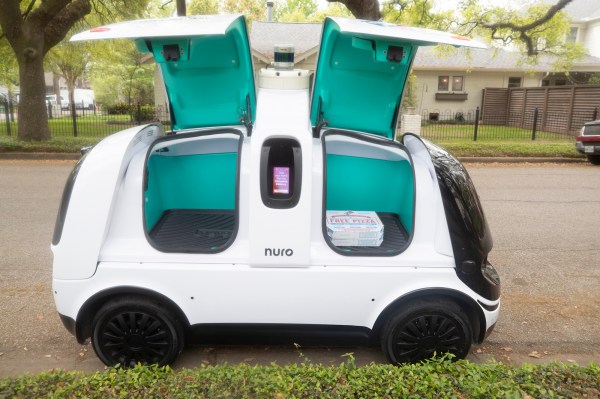Autonomous delivery startup Nuro is in the midst of a restructuring that will result in layoffs and shift resources away from commercial operations and toward R&D.
This is the second time in less than a year that Nuro — a darling of the AV world that has raised $2.13 billion — has laid off workers in a bid to cut costs and extend capital runway. In November, Nuro laid off about 300 people, or 20%, of its workforce. Nuro declined to share how many of its roughly 1,100 employees will be affected. Employees are expected to learn who will be laid off by the end of the week.
This time, the company isn’t just cutting jobs; Nuro is changing its operations, a shift that will pause plans to ramp up commercial operations this year and delay volume production of its Nuro bot — the third-generation, or R3, delivery robot designed to be the flagship of its commercial strategy. Nuro will be able to double its runway by making these changes, giving it enough capital to operate another three years without raising more money, co-founders Dave Ferguson and Jiajun Zhu wrote in a blog post published Wednesday.
Ferguson and Zhu said tightening in the capital markets in general, and deep tech funding in particular, along with recent bank failures and an impending U.S. recession, prompted the company to make changes.
“We’ve entered a new capital environment that will shape the next few years or more. In this new reality, we need to be more efficient with our balance sheet,” they wrote.
The company, flush with capital from high-profile investors including Baillie Gifford, Fidelity Management & Research Company and Google, had the funds to tackle everything at once from R&D and custom vehicle design to deploying commercial pilots with partners like Kroger and Uber. Now, it’s going to scale back or pause commercial operations and put the bulk of its resources and people on developing its autonomous system.
“There is a fundamental tension in the development of self driving between capital efficiency, and speed to building an initial service,” Ferguson and Zhu wrote. “We have historically invested heavily in deploying commercial services and have learned a great deal from our customers. But commercial deployments come at a significant cost, both in terms of resources and autonomy focus. And until the unit economics of these services make sense, we think it is prudent to focus on what we can do efficiently as a startup.”
Nuro said it will continue small-scale commercial operations for testing and learning with select partners. The company has been operating in the Bay Area and Houston and plans to continue operations in those two markets.
The company is also scaling back its manufacturing plans. In 2021, Nuro announced plans to invest $40 million to develop a closed-course track and a 125,000-square-foot factory to “build tens of thousands of robots” in partnership with BYD North America. Ferguson told TechCrunch that Nuro is still planning to use its R3 (Nuro bot), but it will hold back on manufacturing them at scale. It also plans to continue to use its closed-course test track. The facility is still under construction. The alpha R3 bots were built by BYD and assembled and finished at Nuro’s facility in California.
“We are going to have our alpha (R3) vehicles,” Ferguson said, noting that these are the first few dozen R3 bots that it built with BYD. “We will be able to use those on public roads and so we will still transition to doing our testing and our internal deployments. And so you will see R3s on the roads, but it is going to be much more focused on purely deployments for helping advance autonomy as opposed to trying to scale up commercialization.”
Ferguson described this as a staggered approach.
“The idea is that as autonomy gets more and more mature and frankly as it’s able to operate over much larger areas and we basically have generalized autonomy, then we’re going to come back and scale up what the manufacturing and the deployment will be,” he said.
